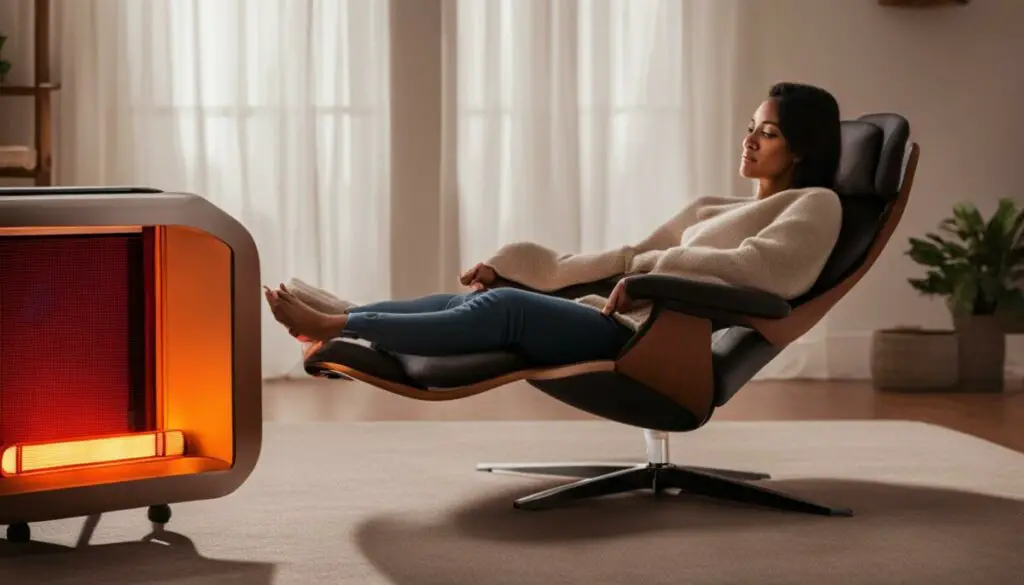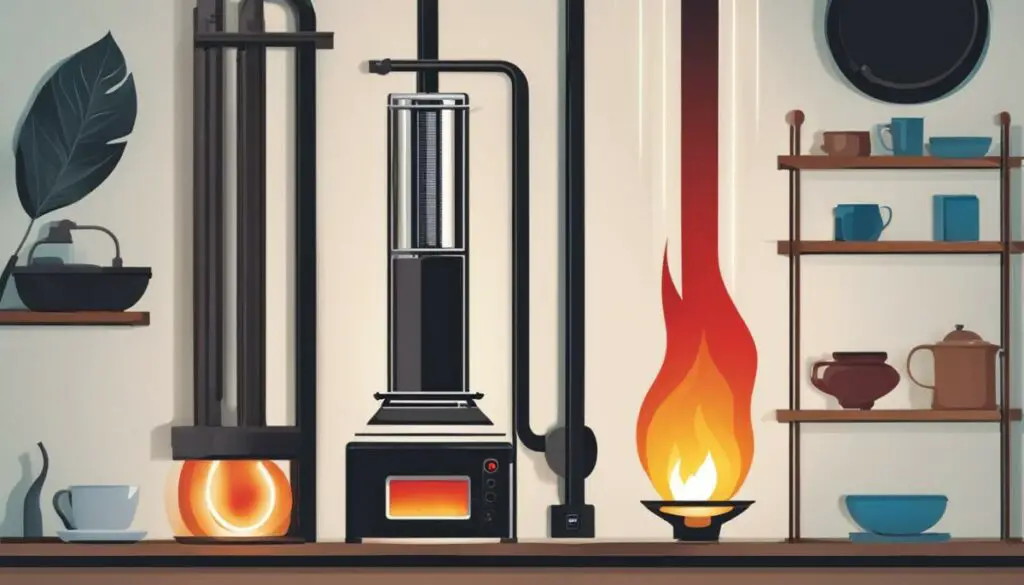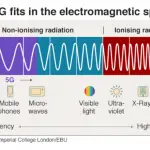Last Updated on 5 months by Francis
When it comes to choosing the right heating solution for your home, it’s important to consider the pros and cons of different options. Two popular choices are infrared heaters and electric heaters. But which one is better? Let’s dive into a comparison between infrared heaters and electric heaters to help you make an informed decision.
Contents
Key Takeaways:
- Understanding the power source and type of heating is key in comparing infrared heaters and electric heaters.
- Infrared heaters use radiant heating, while electric heaters primarily use convection heating.
- Infrared heaters offer versatility and uniform heat without blowing dust or allergens.
- Electric heaters provide even heating and come in various types, such as baseboard, portable, and wall heaters.
- The choice between infrared heaters and electric heaters depends on specific heating needs and preferences.
How Do Infrared Heaters Work?

Infrared heaters are a popular alternative to electric heaters, offering distinct advantages in terms of heating efficiency and comfort. Unlike electric heaters that rely on convection heating to warm the air, infrared heaters utilize a different mechanism to provide warmth. These innovative devices work by converting electricity into radiant heat, which is then emitted as infrared waves.
The emitted infrared waves travel directly to objects and people in the room, heating them up without significantly warming the surrounding air. This means that infrared heaters provide instant warmth, as the heat is absorbed by the objects and individuals in their path. This targeted heating also ensures energy efficiency, as there is no wasted heat loss to the surrounding environment.
Infrared heaters offer numerous benefits over electric heaters, including energy efficiency, instant heat, and targeted heating.
While electric heaters can provide even heating throughout a room, infrared heaters offer a more focused and comfortable heat. The gentle warmth emitted by infrared heaters is often preferred by individuals seeking a cozy heating experience. Additionally, infrared heaters do not rely on blowing air, eliminating the circulation of dust or allergens, which can be particularly beneficial for individuals with respiratory conditions or allergies.
In summary, infrared heaters work by converting electricity into radiant heat, which is emitted as infrared waves. These waves directly heat objects and people in the room, providing instant and energy-efficient warmth. The targeted heating and absence of air circulation make infrared heaters a favorable choice for those seeking a cozy and allergen-free heating solution.
Types of Infrared Heaters
Infrared heaters come in various types, each offering unique advantages and applications. Understanding the different types can help you make an informed decision when choosing the right infrared heater for your needs.
Short Wave Near Infrared Heaters
Short wave near infrared heaters are known for their high temperatures and intense heat output. They emit shorter wavelengths, which allows for faster heat transfer and direct heating of objects and people. These heaters are commonly used in industrial settings, such as drying processes or heating large spaces.
Medium Wave Middle Infrared Heaters
Medium wave middle infrared heaters provide a balanced combination of heat intensity and range. They emit mid-range wavelengths that are effective for both spot heating and larger area heating. These heaters are often used in residential and commercial settings, such as heating patio areas or providing warmth in indoor spaces.
Long Wave Far Infrared Heaters
Long wave far infrared heaters produce a gentle and comforting heat that covers a wider range of temperatures. They emit longer wavelengths, which allows for more subtle and even heating. These heaters are commonly used in residential settings, such as bedrooms, living rooms, or offices, where a cozy and ambient heat is desired.
| Type of Infrared Heater | Advantages | Applications |
|---|---|---|
| Short Wave Near Infrared Heaters | Intense heat output, fast heat transfer | Industrial processes, large spaces |
| Medium Wave Middle Infrared Heaters | Balanced heat intensity, versatile | Residential, commercial settings |
| Long Wave Far Infrared Heaters | Gentle and comforting heat | Residential, office settings |
When choosing an infrared heater, consider the specific heating needs and requirements of your space. Short wave heaters are ideal for large industrial spaces, while medium wave heaters offer versatility for various applications. Long wave heaters provide a cozy ambiance in residential settings. Understanding the advantages and applications of each type can help you select the most suitable infrared heater for your home or business.
Advantages of Infrared Heaters
Infrared heaters offer several advantages over electric heaters, making them a compelling choice for many homeowners. One of the key advantages is their high energy efficiency. Infrared heaters convert a significant portion of the electricity they consume into radiant heat, resulting in minimal heat loss and maximum utilization of energy. This efficiency translates into cost savings and reduced environmental impact.
Another major advantage of infrared heaters is their ability to provide instant heat. Unlike electric heaters that rely on heating the air, infrared heaters emit infrared waves that directly heat objects and people in their path. This means that as soon as you switch on an infrared heater, you can feel the warmth enveloping you, creating a cozy and comfortable environment.
Additionally, the gentle and comforting heat emitted by infrared heaters is favored by many individuals seeking a more natural and pleasant heating experience. The radiant heat produced by these heaters mimics the warmth of the sun, creating a soothing sensation that is particularly beneficial for people with allergies or respiratory conditions.
| Advantages of Infrared Heaters |
|---|
| High energy efficiency |
| Instant heat |
| Gentle and comforting heat |
| No emissions or fuel consumption |
| Low maintenance and silent operation |
Furthermore, infrared heaters are environmentally friendly. They do not produce any emissions or require any fuel consumption, making them a sustainable choice for heating your home. In addition, these heaters have minimal maintenance requirements and operate silently, ensuring a hassle-free and peaceful heating experience.
In summary, the advantages of infrared heaters over electric heaters are their high energy efficiency, instant heat, gentle and comforting warmth, environmental friendliness, and convenient operation. These benefits make infrared heaters a compelling option for homeowners looking for an efficient, eco-friendly, and cozy heating solution.
Advantages of Electric Heaters
When it comes to heating options, electric heaters have their own unique advantages that make them a popular choice for many households. Here are some key benefits of choosing electric heaters over infrared heaters:
- Efficient and Even Heating: Electric heaters are known for their ability to provide efficient and even heating throughout a room. Unlike infrared heaters that offer targeted heating, electric heaters distribute warmth evenly, ensuring every corner of the space is adequately heated.
- Versatility and Customization: Electric heaters come in a variety of types, such as baseboard heaters, portable heaters, panel heaters, and wall heaters. This versatility allows individuals to choose the type of heater that best suits their specific heating needs and preferences.
- Portability: Many electric heaters are designed to be portable, making it easy to move them between rooms. This flexibility allows for convenient heating options, allowing individuals to bring warmth wherever it is needed most.
- Affordable Upfront Costs: In comparison to infrared heaters, electric heaters generally have lower upfront costs, making them a more budget-friendly option. This affordability factor can be appealing to individuals who are looking for cost-effective heating solutions.
Electric heaters offer efficient and even heating throughout a room, providing versatility, customization, and affordability.
While electric heaters have these advantages, it is important to note that they may have higher operating costs and energy consumption compared to infrared heaters. The choice between electric heaters and infrared heaters ultimately depends on individual preferences, the size of the space, heating requirements, and other specific factors. It is recommended to carefully consider these aspects before making a decision.
| Advantages of Electric Heaters | Advantages of Infrared Heaters |
|---|---|
| Efficient and even heating throughout the room | Energy-efficient and environmentally friendly |
| Versatility and customization options | Instant heat and targeted heating |
| Portability for easy movement between rooms | Cozy and gentle warmth |
| Affordable upfront costs | No emissions or fuel consumption |
As with any heating option, it is important to consider the advantages and drawbacks of electric heaters compared to infrared heaters to make an informed decision based on individual needs and preferences.
Considerations for Infrared Heaters

When deciding between infrared heaters and electric heaters, it is important to carefully consider the pros and cons of each option. Infrared heaters offer unique advantages that may make them the preferred choice for certain individuals and situations. However, there are also some considerations and limitations to keep in mind.
Advantages of Infrared Heaters
- Energy Efficiency: One of the major benefits of infrared heaters is their energy efficiency. These heaters convert electricity into heat with minimal heat loss, ensuring that a high percentage of the produced heat is utilized effectively.
- Instant Heat: Infrared heaters provide instant heat as soon as they are switched on. They emit infrared waves that directly heat objects and people in the vicinity without necessity of warming up the surrounding air.
- Targeted Heating: Unlike electric heaters that rely on convection heating to warm the whole room, infrared heaters emit radiant heat that targets specific objects and individuals. This makes them ideal for spot heating and providing localized warmth.
While these advantages make infrared heaters appealing, there are also some considerations to take into account:
- Limited Warming Capabilities: Infrared heaters may not distribute heat evenly throughout a room, making them less suitable for larger spaces or areas with multiple occupants.
- Higher Upfront Cost: Compared to electric heaters, infrared heaters can be more expensive to purchase upfront. However, their energy-efficient operation may help offset this initial investment over time.
Ultimately, the decision between infrared heaters and electric heaters depends on individual heating needs, preferences, and the specific circumstances of the space in question. It is important to consider factors such as room size, insulation, and the desired level of heating efficiency. By carefully weighing the pros and cons, individuals can select the heater that best meets their unique requirements.
Considerations for Electric Heaters

When deciding between electric heaters and infrared heaters, it’s essential to weigh the pros and cons of each option. Electric heaters offer several advantages that may make them the best choice for certain situations.
One of the main advantages of electric heaters is their ability to provide efficient and even heating throughout a room. Whether it’s a baseboard heater, portable heater, panel heater, or wall heater, electric heaters can distribute heat evenly, making them suitable for larger spaces.
Another benefit of electric heaters is their versatility. With various types available, individuals can choose a heater that best meets their specific heating needs. Whether you need a portable heater for on-the-go heating or a wall heater for a more permanent solution, electric heaters offer customization options to suit different preferences.
However, it’s important to consider the potential drawbacks of electric heaters as well. One consideration is their higher operating costs and energy consumption compared to infrared heaters. While electric heaters may be more affordable upfront, the ongoing expenses associated with their use can add up over time.
| Pros of Electric Heaters | Cons of Electric Heaters |
|---|---|
| Efficient and even heating | Higher operating costs |
| Versatile and customizable | Increased energy consumption |
Ultimately, the best choice between electric heaters and infrared heaters depends on individual circumstances and preferences. Factors such as the size of the space, insulation, and specific heating requirements should be taken into account when making a decision. By carefully considering the pros and cons of each option, individuals can make an informed choice that suits their needs.
The Future of Home Heating
As the demand for cleaner and more energy-efficient home heating solutions continues to grow, infrared heaters are emerging as a promising option for the future. With their numerous benefits over electric heaters, more and more people are considering infrared heaters as a viable alternative.
One of the key reasons to choose infrared heaters over electric heaters is their energy efficiency. Infrared heaters convert a higher percentage of electricity into heat, resulting in more efficient heating and potential cost savings in the long run. Additionally, infrared heaters offer instant heat by directly warming up objects and people upon switching on. This targeted heating eliminates the need to wait for the entire room to warm up, providing immediate comfort and convenience.
Another significant benefit of using infrared heaters is their environmentally friendly nature. Unlike electric heaters, infrared heaters do not produce any emissions or require any fuel consumption. This makes them a sustainable heating option that reduces the carbon footprint. Furthermore, the gentle and comforting heat emitted by infrared heaters is often preferred by individuals with allergies or respiratory conditions, as they do not blow dust or allergens into the air.
| Infrared Heaters | Electric Heaters | |
|---|---|---|
| Energy Efficiency | Convert a higher percentage of electricity into heat | Reliable and efficient heating |
| Instant Heat | Directly warms up objects and people | Requires time to warm up the entire room |
| Environmental Impact | Do not produce emissions or require fuel consumption | May contribute to carbon emissions |
While electric heaters also have their advantages, such as efficient and even heating throughout a room and affordability upfront, the future of home heating is leaning towards cleaner and more sustainable options. Infrared heaters offer the benefits of energy efficiency, rapid heat, environmental friendliness, and enhanced comfort. As technological advancements continue to improve and refine infrared heating systems, they are likely to become even more popular in the coming years.
Conclusion
In conclusion, when comparing infrared heaters to electric heaters, it ultimately comes down to individual preferences and specific heating needs. Both options have their own advantages and considerations.
Infrared heaters offer significant benefits such as energy efficiency and targeted heating. They convert a high percentage of electricity into heat, resulting in efficient and cost-effective heating. Additionally, infrared heaters provide instant warmth and can be powered by various sources, including renewable energy. The gentle and comforting heat emitted by infrared heaters enhances comfort and can be particularly beneficial for individuals with allergies or respiratory conditions.
On the other hand, electric heaters provide efficient and even heating throughout a room, making them suitable for larger spaces. They come in various types, allowing for customization based on specific heating requirements. Electric heaters are also portable and often more affordable upfront.
Ultimately, the best choice between infrared heaters and electric heaters depends on factors such as the size of the space, insulation conditions, and personal heating preferences. It is important to consider these factors and carefully weigh the pros and cons before making a decision. Whichever option is chosen, both infrared heaters and electric heaters offer effective heating solutions for a comfortable and cozy home environment.
FAQ
Are infrared heaters better than electric heaters?
The choice between infrared heaters and electric heaters depends on individual preferences, heating requirements, and specific circumstances.
How do infrared heaters work?
Infrared heaters convert electricity into radiant heat, emitting infrared waves that directly heat objects and people without heating the surrounding air.
What are the types of infrared heaters?
There are three main types: short wave near infrared heaters, medium wave middle infrared heaters, and long wave far infrared heaters, each with their own advantages and applications.
What are the advantages of infrared heaters?
Infrared heaters offer benefits such as energy efficiency, instant heat, targeted heating, and being environmentally friendly with low maintenance and silent operation.
What are the advantages of electric heaters?
Electric heaters provide efficient and even heating throughout a room, come in various types for customization, and are generally more affordable upfront.
What should I consider when choosing infrared heaters?
Consider factors such as the size of the space, insulation, and specific heating needs, as infrared heaters are best for spot heating and may not distribute heat evenly throughout a room.
What should I consider when choosing electric heaters?
Consider factors such as the size of the space, insulation, and personal preferences, as electric heaters offer efficient heating but may have higher operating costs and energy consumption.
What is the future of home heating?
As home heating technologies evolve towards cleaner and more energy-efficient options, infrared heaters present a viable choice due to their energy efficiency, environmental friendliness, and potential for cost savings.
What is the conclusion on infrared heaters vs. electric heaters?
The choice between infrared heaters and electric heaters depends on individual preferences, heating requirements, and specific circumstances. Consider factors such as the size of the space, insulation, and personal preferences before making a decision.








